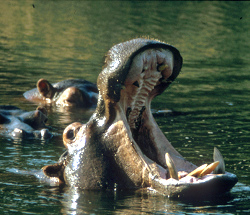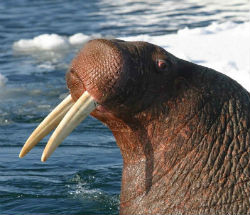Ivory trade: not just an elephant crisis
IVORY TRADE: NOT JUST AN ELEPHANT CRISIS
IT’S NOT JUST ELEPHANTS THAT ARE THREATENED BY PEOPLE’S DESIRE FOR IVORY. AS PART OF OUR ELEPHANTS IN CRISIS CAMPAIGN, BORN FREE’S HEAD OF POLICY DR MARK JONES EXAMINES THE OTHER ANIMALS AT RISK
Ending the ivory trade is key to securing a future for the world’s elephants, more than 20,000 of which are killed by poachers each year for their tusks. The international community is finally waking up to this theat. The USA and China have already introduced near-total bans. France has tightened up its legislation. Taiwan and Hong Kong have committed to act. In the UK, the Ivory Bill is currently working its way through Parliament.
These measures are encouraging, and while much remains to be done, they bring hope that one day the slaughter may end.
But it’s not just elephants that are threatened by people’s desire for ivory. The teeth from several other species, including hippos, walruses and narwhals, are also on the traders’ and traffickers’ wish lists.
Common hippos are much less common than elephants – as few as 115,000 remain across their rapidly reducing range in sub-Saharan Africa. Yet more than 38,000 individual teeth, 26 tonnes of teeth by weight, 6,550 hippo tusks, almost 6,500 ‘carvings’, and various other hippo products were legally traded between countries in the 10 years to 2016 – many destined for EU Member States.
Walruses are also in demand for their ivory. Between 2007 and 2016, more than 150,000 carvings, 12,500 items of ‘jewellery’, and various other walrus items including teeth and tusks were declared to have been traded internationally.
The distinctive long helical ‘tusk’ of the male narwhal, which is actually an elongated canine tooth, is also coveted. More than 2,500 tusks, 2,100 carvings and various other products from these toothed whales were traded commercially between countries in the decade to 2016.
Other species such as warthogs are also targeted for their teeth, although because they are not currently classified as threatened, data on international trade is lacking.
While the international community is rightly focused on protecting elephants, we must not forget that the trade in ivory for trinkets and carvings also threatens several other species. Some UK traders have already flagged increasing interest in hippo ivory as a replacement for elephant ivory to maintain the value of some objects from which the ivory has been lost or broken, or as a means of getting around a future ban on elephant ivory.
The UK’s Ivory Bill is very welcome, but it currently only covers elephant ivory. Thanks to Born Free’s efforts, the Government has committed to consulting on extending the ban to other ivory-bearing species once the Bill becomes law. For the sake of hippos, walruses, narwhals and others, we must hold them to this commitment, so the UK can act as an example to the rest of the world.
These precious and diminishing wild animals will only be safe once we end the demand for, and trade in, all ivory products for good.


